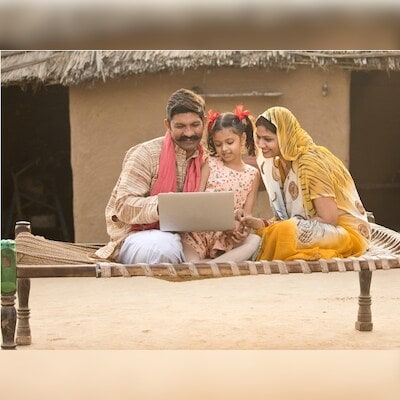Over 82 per cent of youth in rural areas between 15 and 25 years of age can use the internet while the figure is nearly 92 per cent in urban cities, showed a government survey.
It also found that 95.7 per cent of persons aged 15-24 years in rural areas can use mobile phones, slightly lower than 97 per cent in urban areas.
Click here to connect with us on WhatsApp
On Wednesday, the Ministry of Statistics & Programme Implementation released key findings of a Comprehensive Annual Modular Survey (CAMS) conducted from July 2022 to June 2023. This is part of the 79th round of the National Sample Survey (NSS).
“82.1 per cent of rural youth aged 15-24 years can use the internet, compared to 91.8 per cent in urban areas,” an official statement said.
The survey findings suggest that 78.4 per cent of youth aged 15-24 years can send messages with attached files, while 71.2 per cent can use copy-and-paste tools. Moreover, 26.8 per cent can perform more advanced tasks like searching for information, sending emails, and conducting online banking.
As per the survey, the percentage of households possessing a telephone/ mobile phone stood at 95.1 per cent (94.2 per cent in rural and 97.1 per cent for urban).
The percentage of households possessing a computer (desktop PC, laptop etc) is 9.9 per cent (4.2 per cent in rural and 21.6 per cent in urban areas).
Among other key findings, the survey revealed that 96.9 per cent of persons aged 15-24 years are able to read and write simple statements with understanding and also able to perform simple arithmetic calculations.
In the same age group, the figure stands around 97.8 per cent for males and 95.9 per cent for females.
“The mean years of schooling in formal education, for persons age 15 years and above is 8.4 at the all-India level and the same is 7.5 for persons age 25 years and above,” the ministry said.
The average out-of-pocket medical expenditure per household on hospitalisation during the last 365 days in rural and urban areas is Rs 4,129 and Rs 5,290, respectively.
Additionally, the average out-of-pocket medical expenditure per household on non-hospitalisation during the last 30 days in rural and urban areas is Rs 539 and Rs 606, respectively.
The survey found that 93.7 per cent urban population has convenient access to low-capacity public transport (bus, car, taxi, auto etc) within 500 metres from the place of living.
The survey further said that the percentage of youth reported to be not in education, employment, or training, for the age group 15-24 years was 23.3 per cent (25 per cent rural and 19 per cent urban).
The government said the survey covered the whole of the India Union except for some villages of Andaman and Nicobar Islands which were difficult to access.
At the all-India level, the total number of first-stage units (FSUs) surveyed for the central sample was 15,298 (8,758 in rural areas and 6,540 in urban areas).
The total number of households surveyed was 3,02,086 (1,73,096 in rural areas and 1,28,990 in urban areas) and the total number of persons enumerated was 12,99,988 (7,85,246 in rural areas and 5,14,742 in urban areas).
The primary objective of CAMS was to collect data to generate indicators related to education, out-of-pocket medical expenditure, use of mobile and internet, financial inclusion, ICT skills, possession of assets, etc.
In addition, information related to drinking water, sanitation, energy use, birth registration, access to transport facilities, etc was also collected.
According to the survey, 94.6 per cent of people aged 18 years and above have an account individually or jointly in any bank/ other financial institution/ mobile money service provider.
Number of borrowers, aged 18 years and above, per 1,00,000 persons stood at 18,322 (18,714 rural and 17,442 urban).
In this survey, a person is considered to be indebted if s/he has taken a cash loan of Rs 500 or above and that loan remained outstanding as on the date of the survey. These borrowers were indebted to any institutional/ non-institutional agency as on date of the survey for each gender at the all-India level.
The survey revealed that 90.6 per cent of persons of age less than 5 years have registered with civil authority for the birth certificate ever, including those who received birth certificates.
Households using clean fuel for cooking (among households reported having cooking arrangements) stood at 63.4 per cent (49.3 rural and 92.9 per cent urban).
The survey found that households having access to improved principal source of drinking water stood at 95.7 per cent, while households having access to improved latrine (among households with access to latrine) stood at 97.8 per cent.
(Only the headline and picture of this report may have been reworked by the Business Standard staff; the rest of the content is auto-generated from a syndicated feed.)
First Published: Oct 09 2024 | 11:44 PM IST
